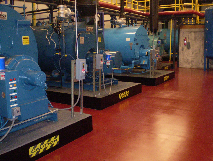All of us who work around Boilers are aware of the dangers posed by these machines if safe operations and maintenance are not followed. One study, of 23,338 accidents involving boilers and pressure vessels, shows that 83% of these accidents were a direct result of human oversight and/or lack of knowledge. GCAP believes that through the creation and implementation of effective Operating Procedures this number can be greatly reduced. To show the relationship between not following procedures and accidents occurring let’s take a quick look at the Aviation industry.
One NTSB study of 37 aviation accidents, that were caused by the flight crew, shows that 29 or 78% were a direct result of “Procedural Errors”. Simply said the flight crew did not follow the procedures that were in place. Another study, by NTSB, showed 86 accidents that were a direct result of a lack of procedures or failure to follow the procedures that were in place. This is a stark reminder of the importance of establishing sound Operating Procedures and also how important it is that employees follow the Operating Procedures.
One may ask what details should be in the Operating Procedures. Simply put, Operating Procedures should cover all aspects of Day to Day operations, Temporary Procedures that may need to be used during times of maintenance etc., Emergency Procedures, and also procedures for the proper Inspection, Testing & Maintenance of all Boiler room equipment and all ancillary equipment. Procedures should serve as the road map for how equipment should be operated and maintained. Procedures should give the employee the answers they need to operate and maintain the equipment they are responsible for during all phases of operation. Procedures should also be developed and implemented that address the steps necessary when boiler room equipment is not operating within its “Normal Parameters”.
There is NO one size fits all when it comes to Operating Procedures. Procedures must be based on a facility’s unique operational parameters and equipment. Safety should always be the first priority of any Operating Procedure. Procedures should be developed in written formats as verbal communication of Procedures is a very unreliable method. Procedures should also be viewed as “The Way” to operate and maintain the system.
It is also important to develop procedures that address the proper maintenance of Boilers, Safety devices and all equipment in the system. Many accidents have resulted from poor maintenance of critical safety devices on Boilers. Many more accidents have occurred because critical safety devices have been bypassed because they were not working correctly. Procedures should never allow for a critical safety to be bypassed. The bypassing of safeties is ALWAYS a recipe for disaster.
Once procedures have been developed now comes the time to implement them. This can sometimes be the hardest step. One must ensure that employees are trained in the Procedure and also ensure that the employees understand the procedures. Then one must also ensure that employees are FOLLOWING the procedures.
History has shown us that through the development and implementation of good Operating Procedures can greatly reduce accidents. For more information on boiler operating procedures please contact Garden City Ammonia Program.


